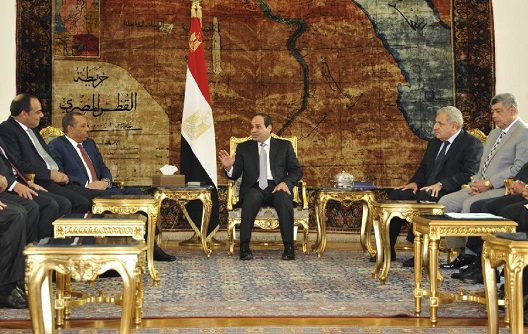![Photo: Egyptian President Abdel-Fattah el-Sissi, center, meets Libya's interim Prime Minister Abdullah al-Thinni, second left, in Cairo, Egypt, Wednesday, October 8, 2014 [MENA]](http://www.atlanticcouncil.org/wp-content/uploads/2014/10/20141010Libya.jpg) As Egypt simultaneously rejects foreign intervention in Libya’s internal affairs and inches ever closer into a partnership of assistance with its neighbor to the west, announcing its plans to train Libyan forces to fight terrorism. Libyan Prime Minister Abdullah al-Thinni’s recent visit to Cairo has served to further cement this partnership between an anti-Islamist Egyptian government and a Libyan government, brought into power without a majority vote, and at odds with its own Islamist base at home.
As Egypt simultaneously rejects foreign intervention in Libya’s internal affairs and inches ever closer into a partnership of assistance with its neighbor to the west, announcing its plans to train Libyan forces to fight terrorism. Libyan Prime Minister Abdullah al-Thinni’s recent visit to Cairo has served to further cement this partnership between an anti-Islamist Egyptian government and a Libyan government, brought into power without a majority vote, and at odds with its own Islamist base at home.
“The [Libyan] House of Representatives has gone from imperfect to harmful. Elected by less than 20 percent of the population amid volatile political warfare, inexperienced parliamentarians failed to appreciate the importance of promoting a culture of inclusiveness and transparency.
Prime Minister Abdullah al-Thinni, appointed by the House, has only served to shrink the space for neutrality, partnering with like-minded external actors whose interests severely limit the chance for a negotiated solution. This week, al-Thinni traveled to Egypt to meet with President Abdel Fattah al-Sisi for discussions that focused almost entirely on security concerns. At the conclusion of their meeting, the two leaders announced their intentions to increase their cooperation in the fight against terrorism, with Egypt pledging to “support all the needs of our (Libyan) brothers.”
A recent blog post on MENASource notes the consequences of a close Egypt-Libya partnership on a de-escalation of the conflict in Libya and on the future of political Islam in the country:
1. The meeting further demonizes Islamists rather than promoting efforts to bring them into the political fold, thereby escalating the conflict in Libya.
2. It undermines efforts by other international players to facilitate peaceful negotiations.
Read the full article by the Atlantic Council’s Senior Fellow, Karim Mezran, “Egypt and Libya: A Fatal Embrace?”
Image: Photo: Egyptian President Abdel-Fattah el-Sissi, center, meets Libya's interim Prime Minister Abdullah al-Thinni, second left, in Cairo, Egypt, Wednesday, October 8, 2014 [MENA]
